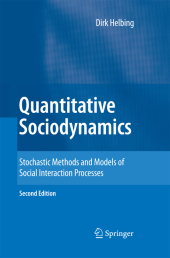 Neuerscheinungen 2014Stand: 2020-02-01 |
Schnellsuche
ISBN/Stichwort/Autor
|
Herderstraße 10
10625 Berlin
Tel.: 030 315 714 16
Fax 030 315 714 14
info@buchspektrum.de |

Dirk Helbing
Quantitative Sociodynamics
Stochastic Methods and Models of Social Interaction Processes
2. Aufl. 2014. xxix, 333 S. 235 mm
Verlag/Jahr: SPRINGER, BERLIN; SPRINGER BERLIN HEIDELBERG 2014
ISBN: 3-642-42402-3 (3642424023)
Neue ISBN: 978-3-642-42402-1 (9783642424021)
Preis und Lieferzeit: Bitte klicken
Updated and revised, this new edition of Quantitative Sociodynamics presents a general strategy for interdisciplinary model building and its application to a quantitative description of behavioral changes based on social interaction processes.
When I wrote the book Quantitative Sociodynamics, it was an early attempt to make methods from statistical physics and complex systems theory fruitful for the modeling and understanding of social phenomena. Unfortunately, the ?rst edition appeared at a quite prohibitive price. This was one reason to make these chapters available again by a new edition. The other reason is that, in the meantime, many of the methods discussed in this book are more and more used in a variety of different ?elds. Among the ideas worked out in this book are: 1 - a statistical theory of binary social interactions, - a mathematical formulation of social ?eld theory, which is the basis of social 2 force models, - a microscopic foundation of evolutionary game theory, based on what is known today as ´proportional imitation rule´, a stochastic treatment of interactions in evolutionary game theory, and a model for the self-organization of behavioral 3 conventions in a coordination game. It, therefore, appeared reasonable to make this book available again, but at a more affordable price. To keep its original character, the translation of this book, which 1 D. Helbing, Interrelations between stochastic equations for systems with pair interactions. Ph- icaA 181, 29-52 (1992); D. Helbing, Boltzmann-like and Boltzmann-Fokker-Planck equations as a foundation of behavioral models. PhysicaA 196, 546-573 (1993). 2 D. Helbing, Boltzmann-like and Boltzmann-Fokker-Planck equations as a foundation of beh- ioral models. PhysicaA 196, 546-573 (1993); D.
and Summary.- Dynamic Decision Behavior.- Stochastic Methods and Non-linear Dynamics.- Master Equation in State Space.- Boltzmann-Like Equations.- Master Equation in Configuration Space.- The Fokker-Planck Equation.- Langevin Equations and Non-linear Dynamics.- Quantitative Models of Social Processes.- Problems and Terminology.- Decision Theoretical Specification of the Transition Rates.- Opinion Formation Models.- Social Fields and Social Forces.- Evolutionary Game Theory Game theory!evolutionary bb .- Determination of the Model Parameters from Empirical Data Empirical experience bb .
From the reviews:
"This ambitious volume aims to provide a comprehensive account of mathematical methods for the quantitative study of social processes, with a focus on stochastic methods. ... To summarise, as an introduction to such mathematics, it is admirably comprehensive and goes through the various derivations in a careful step-by-step manner. ... an excellent reference for those with some mathematical expertise in the area to refer to. For those who straddle the simulation and mathematical communities it could be very useful." (Bruce Edmonds and Mario Paolucci, Journal of Artificial Societies and Social Simulation, April, 2012)


